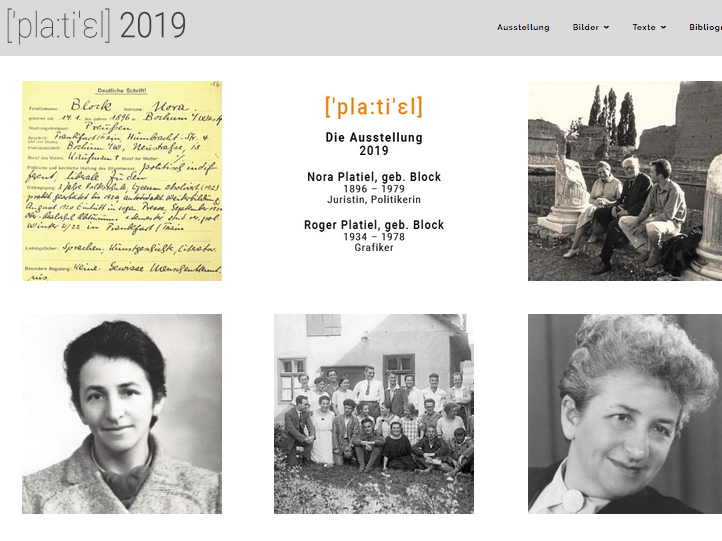Nora-Platiel-Prize
Nora Platiel as namesake of the award
With Nora Platiel as the name giver for the prize of the association, reference is made to a person who, with her life's work, can serve as a role model for young scholars and who, with her socio-political and legal commitment in Kassel and Hesse, offers numerous points of contact to the Association for the Promotion of Research and Knowledge Transfer in Social Law and Social Policy and to the Research Association for Social Law and Social Policy.
This naming is intended to give visibility to the work of a Jewish lawyer and committed social politician.
In detail, the following moments have moved the sponsoring association to name the award after Nora Platiel:
1. the local and regional reference of her work, 2. the familiarity of her name in Kassel, 3. manifold content-related references to the focal points of the work of the association and FoSS, 4. her understanding of socio-political and legal-practical work that transcends disciplinary boundaries and our understanding of committed interdisciplinarity, 5. the naming takes a stand against strengthening anti-Semitic and anti-feminist positions.
Some notes on the life and work of Nora Platiel
(Basis: texts of the traveling exhibition "Jewish Women Lawyers of Jewish Origin," Deutscher Juristinnenbund e.V. [ed.], 2019, pp. 109-112)
FAMILY Nora-Platiel was born in Bochum on Jan. 14, 1896, the eighth of ten children. Her parents Therese and Bendix Block, liberal Jews, ran a clothing store in downtown Bochum. The death of the father in 1915 plunged the family into serious financial difficulties. During the period of emigration in Paris, she met Gerhard Kumleben, a member of the International Socialist Fighting League (ISK). The relationship broke up before their son Roger was born in 1934. In 1943 she married Hermann Platiel in Montauban.
SCHOOL, STUDY, REFERENDARIAT After the death of her father, she helped her mother in the business, which went bankrupt in 1917. Following her volunteer work with the International War Relief Service during World War I and jobs for Helene Stöcker and Elisabeth Rotten, she graduated from high school in Berlin in 1922 and studied law. Her goal was to become a lawyer in order to "work for the enforcement of law in society." Women's rights, socialism and peace were among her political goals. After her first state examination in 1927 and legal clerkship at the district court of Bochum, she passed her second state examination in 1931. In 1931 she was the first female lawyer to open her office in Bochum. Among other things, she was a criminal defense lawyer in political trials and worked for the Red Help of Germany (RHD).
EXCLUSION AND CONVICTION, EXILE IN PARIS AND ZURICH Since her school days, Nora-Platiel was repeatedly exposed to anti-Semitic experiences. As a Jew, a socialist and the only woman among the lawyers admitted to the bar in Bochum, she directly attracted the attention of the National Socialists, especially Roland Freisler. The SS repeatedly tried to arrest her. She fled to Paris in early March 1933.
She found a job as editorial secretary at the exile magazine the "New Diary" and wrote for "Cahier Juifs," among other publications. She continued to work for the ISK and on a white paper on Hitler's Germany. From 1934 to 1939 she worked for the Omnium Métallurgique company. After her internment in 1940 in Gurs and escape to Montauban, she took over the management of an office of the CAR (Comité d'Assistance aux Réfugiés) there, which was supported by the Swiss Workers' Relief Agency (SAH). She later fled further to Switzerland, where she continued to be employed by the SAH. Since refugees were unwelcome in Switzerland, she decided to return to Germany in 1949.
RETURN TO GERMANY The Hessian judicial service hired her as a judge in 1949 and assigned her to a reparations chamber at the Kassel Regional Court. In 1951, after a brief stint at the Frankfurt Higher Regional Court, she became Hesse's first regional court director. At the same time, Nora Platiel became involved in prisoner welfare in Kassel.
In her own reparation proceedings, she received compensation in 1956, seven years after filing her claim, which amounted to just 20 percent of what she would have presumably earned during the 16 years of emigration - minus her real income during that time.
Starting in 1954, she was elected to the Hessian state parliament for three consecutive legislative periods, and for six years she was deputy leader of the SPD parliamentary group. In this capacity, she fought, among other things, against the threat of emergency laws and advocated rapprochement with Israel. In addition, she was, among other things, a member of the Hessian State Court and the Judges' Election Committee. In 1962 she was defeated by a margin of one vote in the election for the office of president of the state parliament. In 1966 she left the Landtag; she had been, in the general opinion, the "best speaker in parliament" and the "conscience of the Landtag."
SOCIAL AND PROFESSIONAL ACTIVITIES Nora Platiel had joined the "German League for International Law" in 1918 and the SPD in 1922. She worked in the International Youth League (IJB). She was active in the French exile and also later in Jewish aid organizations. After the dissolution of the IJB, she rejoined the SPD and in time assumed a leading role in the Kassel SPD. As a lawyer, she took an active part in the discussions of the time about the discrimination of women in family and labor law. Again and again, as a politician, lawyer and affected person, she pointed out in vain the insufficient denazification of the German judiciary and politics.
Nora Platiel died in Kassel on September 6, 1979.

